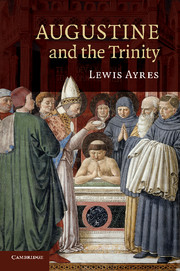Book contents
- Frontmatter
- Contents
- Acknowledgements
- List of abbreviations
- Introduction
- Part I Origins
- Part II Ascent
- Part III Into the mystery
- 7 Recommending the source
- 8 Essence from essence
- 9 Showing and seeing
- 10 Loving and being
- Part IV Memory, intellect and will
- Epilogue: Catching all three
- Bibliography
- Scripture index
- General index
- References
10 - Loving and being
Published online by Cambridge University Press: 06 December 2010
- Frontmatter
- Contents
- Acknowledgements
- List of abbreviations
- Introduction
- Part I Origins
- Part II Ascent
- Part III Into the mystery
- 7 Recommending the source
- 8 Essence from essence
- 9 Showing and seeing
- 10 Loving and being
- Part IV Memory, intellect and will
- Epilogue: Catching all three
- Bibliography
- Scripture index
- General index
- References
Summary
THE SPIRIT AS AGENT OF UNITY
In earlier chapters I traced the emergence of Augustine's account of the Spirit's ‘role’ in the Trinity. We followed his early accounts of the Spirit's status as that which draws us to God, as the love through which we are drawn, as the will and goodness of God in creation, and as the love between Father and Son. In the summary of Trinitarian faith at the beginning of De trinitate 1 we first see Augustine making reference to texts that identify the Spirit as the Spirit of Father and the Spirit of Son, such as Galatians 4.6 (‘God has sent the Spirit of his Son into our hearts’) and Romans. 8.9–11 (‘the Spirit of Christ … the Spirit of Him who raised Christ from the dead’). This language is again mentioned in the 9th of his tractates on John and in summary statements in Sermon 52 and De trinitate 4, and then is first subject to extensive discussion in De trinitate 5 and 6. Further extensive discussion is offered around a decade later in De trinitate 15, and the language is also present in many summary contexts.1 Augustine's reflections on this language constitute a key plank of his increasingly subtle mature treatments of the Spirit.
In Book 5 Augustine tells us that the Spirit is spoken of relatively (relative dicitur) when he is said to be of the Father and of the Son; but the relation that is spoken of is only revealed by the title Gift.
- Type
- Chapter
- Information
- Augustine and the Trinity , pp. 251 - 272Publisher: Cambridge University PressPrint publication year: 2010



